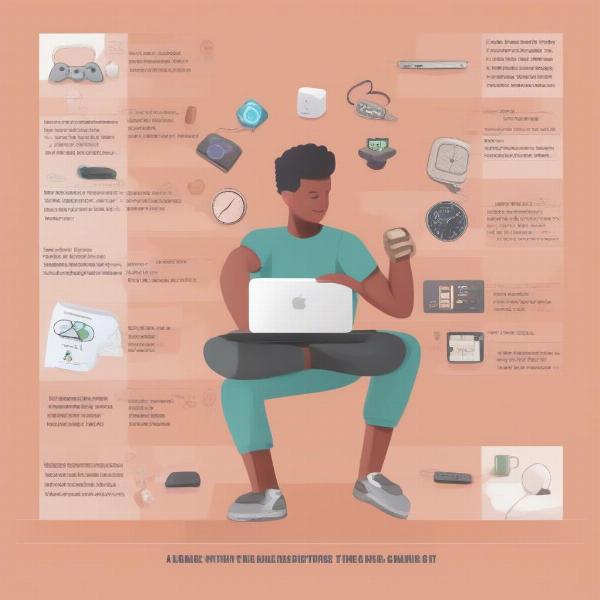Are Video Games Good For Adhd? It’s a question many parents and individuals with ADHD grapple with. While conventional wisdom might suggest limiting screen time, the reality is more nuanced. Video games can offer both benefits and drawbacks for those with ADHD, and understanding this complex relationship is crucial.
The Double-Edged Sword: Video Games and ADHD
Video games can be incredibly engaging, capturing attention and providing a sense of accomplishment. This can be particularly appealing to individuals with ADHD who often struggle with focus and motivation. However, this same engaging nature can also lead to excessive gameplay and potential negative consequences. Finding the right balance is key to harnessing the potential benefits while minimizing the risks.
Benefits of Gaming for ADHD
- Improved Focus and Attention: Certain video games require sustained attention and quick reflexes, which can inadvertently train these skills. Action-packed games, for example, demand focus on specific tasks, potentially improving attention span over time.
- Enhanced Cognitive Skills: Strategy games and puzzle games can enhance problem-solving skills, critical thinking, and working memory. These games often require players to think strategically, plan ahead, and adapt to changing circumstances, skills valuable for managing ADHD challenges.
- Boosting Self-Esteem: Successfully completing levels, achieving goals, and mastering game mechanics can boost self-esteem and provide a sense of accomplishment. This is particularly important for individuals with ADHD who may struggle with feelings of inadequacy or frustration in other areas of life.
- Developing Social Skills: Multiplayer games can foster teamwork, communication, and social interaction. Working collaboratively towards a common goal can help individuals with ADHD develop social skills and build relationships.
 ADHD Benefits of Video Games
ADHD Benefits of Video Games
Potential Downsides of Gaming for ADHD
- Risk of Addiction: The immersive nature of video games can be addictive, leading to excessive gameplay and neglecting other important aspects of life, such as schoolwork, social interactions, and physical activity.
- Sleep Disruption: Playing video games close to bedtime can interfere with sleep patterns. The stimulating nature of games can make it difficult to wind down and fall asleep, exacerbating existing sleep problems often associated with ADHD.
- Increased Impulsivity: Some video games can encourage impulsive behavior, which can be problematic for individuals with ADHD who already struggle with impulse control. Fast-paced games might reinforce impulsive decision-making.
- Exacerbating Hyperactivity: The constant stimulation of video games can heighten hyperactivity and restlessness, making it more challenging to focus on tasks requiring sustained attention and calmness.
 ADHD Downsides of Video Games
ADHD Downsides of Video Games
Finding the Balance: Healthy Gaming Habits for ADHD
How can individuals with ADHD enjoy the benefits of gaming while mitigating the potential downsides? Establishing healthy gaming habits is crucial.
- Set Time Limits: Establish clear time limits for gaming sessions and stick to them. Use timers and parental controls to enforce these limits.
- Schedule Gaming Time: Integrate gaming time into a structured daily schedule, ensuring it doesn’t interfere with other essential activities. Treat gaming as a reward for completing tasks.
- Choose Games Wisely: Select games that promote cognitive skills, strategic thinking, and creativity. Avoid games that are excessively violent, addictive, or encourage impulsive behavior.
- Prioritize Sleep Hygiene: Avoid playing video games close to bedtime. Establish a relaxing bedtime routine and ensure adequate sleep to manage ADHD symptoms effectively.
 Healthy Gaming Habits for ADHD
Healthy Gaming Habits for ADHD
FAQs About Video Games and ADHD
- Can video games improve focus in children with ADHD? Some studies suggest certain video games can improve attention and focus in children with ADHD, but more research is needed.
- Are all video games bad for ADHD? No, not all video games are bad for ADHD. Choosing appropriate games and setting healthy gaming habits is key.
- How can I help my child with ADHD manage their gaming time? Setting clear time limits, scheduling gaming time, and choosing appropriate games can help manage gaming time effectively.
- What types of games are beneficial for ADHD? Strategy games, puzzle games, and games that require planning and problem-solving can be beneficial.
- Can video games replace traditional therapies for ADHD? No, video games should not replace traditional therapies. They can be a complementary tool but not a primary treatment.
- What are the signs of video game addiction in children with ADHD? Excessive gameplay, neglecting other responsibilities, withdrawal symptoms when not playing, and irritability are potential signs.
- Should I completely ban video games for my child with ADHD? A complete ban isn’t always necessary. Moderation and healthy gaming habits are often more effective.
Exploring Further: ADHD and Technology
Beyond video games, technology plays a multifaceted role in the lives of individuals with ADHD. While there are certainly potential downsides, technology can also offer valuable tools and resources for managing ADHD symptoms and improving daily life.
Assistive Technologies for ADHD
Various assistive technologies can help individuals with ADHD stay organized, manage time effectively, and improve focus. These tools can be particularly helpful for students and professionals.
- Note-Taking Apps: Digital note-taking apps can help capture thoughts, organize information, and improve recall.
- Time Management Software: Time management apps and software can help individuals with ADHD stay on track, prioritize tasks, and meet deadlines.
- Focus-Enhancing Tools: Website blockers and noise-canceling headphones can minimize distractions and improve focus.
The Impact of Social Media on ADHD
Social media presents unique challenges and opportunities for individuals with ADHD. While excessive social media use can exacerbate impulsivity and attention problems, it can also provide a platform for connecting with others and finding support.
Conclusion
Are video games good for ADHD? The answer isn’t a simple yes or no. Video games can offer certain benefits for individuals with ADHD, such as improved focus, enhanced cognitive skills, and increased self-esteem. However, excessive gaming can lead to addiction, sleep disruption, and increased impulsivity. Finding the right balance through healthy gaming habits and choosing appropriate games is crucial. By understanding the complex relationship between video games and ADHD, parents and individuals with ADHD can harness the potential benefits while mitigating the risks. This balanced approach allows individuals with ADHD to enjoy the engaging world of video games while prioritizing their overall well-being.

